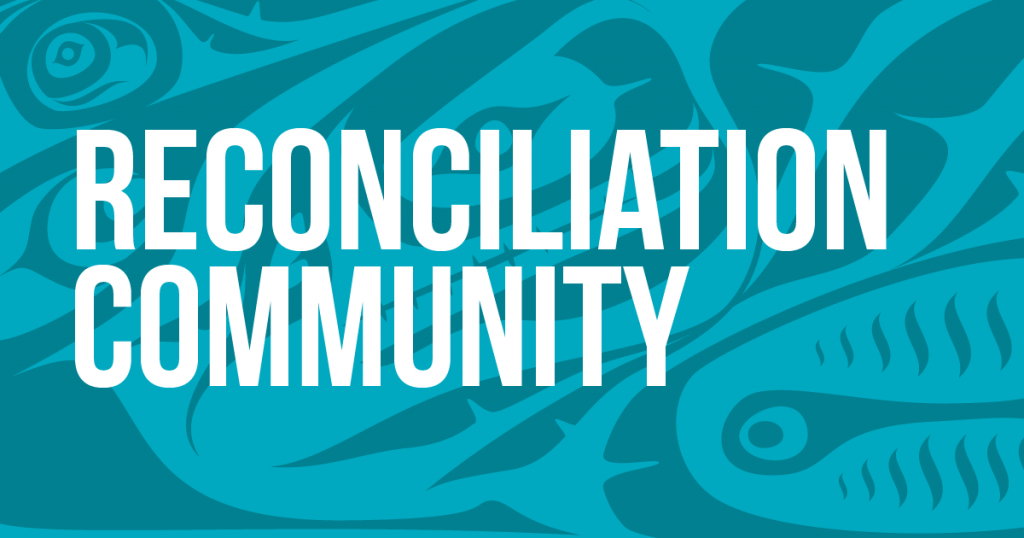
Interview with our partner – West Van Memorial Library
Jun 20, 2019We are thrilled to announce that the West Van Memorial Library was recently awarded the Building Better Communities Award by the British Columbia Library Association. The West Van Memorial Library has been continuously working with us to expand the community’s understanding of local Indigenous history and Canada’s role in truth and reconciliation.
We had the opportunity to hear from Pat Cumming, Head of Customer & Community Experience about her engagement in reconciliation.

What does reconciliation mean to you?
Reconciliation takes many forms – Nation to Nation, organizational and personal. At the Library, we aim to support community members in their personal journeys towards learning about a history that was hidden for many years, and its ongoing impacts in Indigenous communities. In many respects, the truth comes before reconciliation – it’s important for people to learn historical truths as well as the truth about the resilience and rich culture of Indigenous Peoples that is evident today. It’s also important that individuals have the opportunity to define reconciliation in a way that reflects their personal values. For me, reconciliation is a journey of continuous learning which leads to actions, large and small, that contribute to a future where the relationship between Indigenous and non-Indigenous Peoples is based on mutual respect.
How did you first get involved in reconciliation?
The Honouring Reconciliation: Hearing the Truth initiative began with a Canada 150 grant. From the outset, however, it was clear that this was not a project but rather the development of an ongoing practice that would continue well beyond the grant time frame. It was also clear that it would be necessary to build and cultivate relationships with Indigenous organizations and the local Squamish Nation. We were very fortunate that Reconciliation Canada supported and partnered with us from the outset.
What is your vision for reconciliation, on a personal level and organizational level?
On an organizational level, our vision is to view everything that we do through the lens of reconciliation. This means decolonizing our practices where possible, offering programming and collections that represent Indigenous perspectives and consulting with local First Nations in our planning. On a personal level, this journey has been transformational. In my perfect world, stereotypes would be challenged at every turn, all Canadians would have the opportunity to learn about and acknowledge the hardship and challenges that our history has imposed on Indigenous Peoples and everyone would commit to a better future through reconciliation. I recognize that we have a long way to go but we can start by building respectful relationships.
What do you wish you had known at the start of this journey?
The dark parts of history and the legacy of residential schools have been brought to light in recent years and most people have a basic awareness of the struggles and challenges that resulted from destructive policies and practices. What we discovered as we went further in our learning is the fierce strength and resilience that Indigenous Peoples have exhibited in the face of incredible challenges. Much was lost but much was retained through sheer determination and bold resistance. It would have been helpful to have had that perspective from the outset.
What advice do you have for Canadians looking to join the movement?
Listen and read. Learn everything that you can. The Truth and Reconciliation Commission’s 94 Calls to Action is a good starting point. Be prepared for a marathon, not a sprint. Many of us are hardwired to jump to action and to fix problems. Resist that urge and commit to acknowledgment, respect and building positive relationships that can lead to real change. Enjoy the journey and the gifts of the people you meet along the way. We are so grateful for the generosity, warmth, and wisdom of the people we have worked with.
What advice do you have for organizations across Canada to get started or to stay motivated?
There are a number of steps that organizations can take and a number of factors that contribute to success and motivation. Some of the most important things are:
- Ensure that there is a commitment from organizational leadership
- Provide multiple learning opportunities for staff at all levels of the organization so that everyone feels that they have a role to play in reconciliation
- Allow sufficient time for the learning and reflection
- Attend local Indigenous cultural events
- Take time to build relationships with local First Nations before taking action
- Engage with members of the local Indigenous community and include their perspectives when planning and implementing initiatives
- Know your local context. Learn about the protocols that are in place in the territories where you operate and what is important to the First Nations people who live there.
- Be flexible with timing, processes, and procedures when possible
- Be humble, be respectful, be brave


